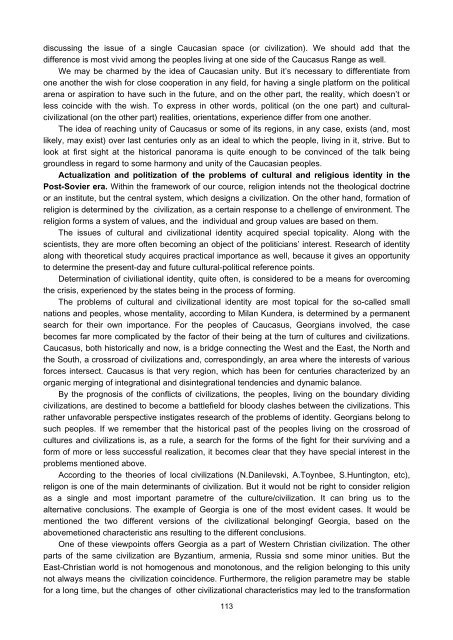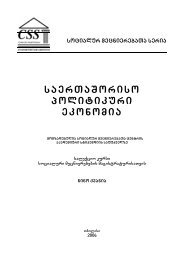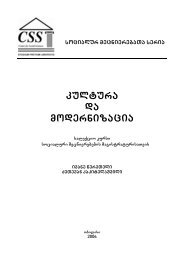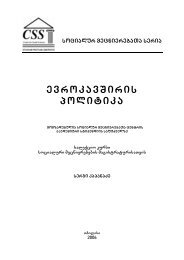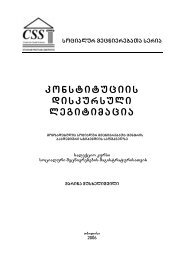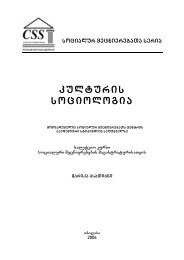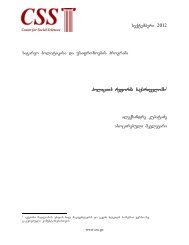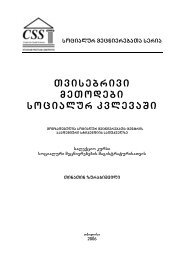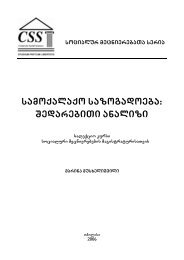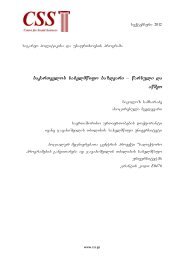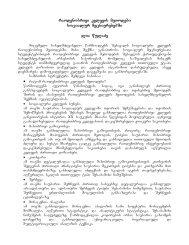kavkasiis geografiuli garemo da mosaxleoba - Center for Social ...
kavkasiis geografiuli garemo da mosaxleoba - Center for Social ...
kavkasiis geografiuli garemo da mosaxleoba - Center for Social ...
Create successful ePaper yourself
Turn your PDF publications into a flip-book with our unique Google optimized e-Paper software.
discussing the issue of a single Caucasian space (or civilization). We should add that the<br />
difference is most vivid among the peoples living at one side of the Caucasus Range as well.<br />
We may be charmed by the idea of Caucasian unity. But it’s necessary to differentiate from<br />
one another the wish <strong>for</strong> close cooperation in any field, <strong>for</strong> having a single plat<strong>for</strong>m on the political<br />
arena or aspiration to have such in the future, and on the other part, the reality, which doesn’t or<br />
less coincide with the wish. To express in other words, political (on the one part) and culturalcivilizational<br />
(on the other part) realities, orientations, experience differ from one another.<br />
The idea of reaching unity of Caucasus or some of its regions, in any case, exists (and, most<br />
likely, may exist) over last centuries only as an ideal to which the people, living in it, strive. But to<br />
look at first sight at the historical panorama is quite enough to be convinced of the talk being<br />
groundless in regard to some harmony and unity of the Caucasian peoples.<br />
Actualization and politization of the problems of cultural and religious identity in the<br />
Post-Sovier era. Within the framework of our cource, religion intends not the theological doctrine<br />
or an institute, but the central system, which designs a civilization. On the other hand, <strong>for</strong>mation of<br />
religion is determined by the civilization, as a certain response to a chellenge of environment. The<br />
religion <strong>for</strong>ms a system of values, and the individual and group values are based on them.<br />
The issues of cultural and civilizational identity acquired special topicality. Along with the<br />
scientists, they are more often becoming an object of the politicians’ interest. Research of identity<br />
along with theoretical study acquires practical importance as well, because it gives an opportunity<br />
to determine the present-<strong>da</strong>y and future cultural-political reference points.<br />
Determination of civiliational identity, quite often, is considered to be a means <strong>for</strong> overcoming<br />
the crisis, experienced by the states being in the process of <strong>for</strong>ming.<br />
The problems of cultural and civilizational identity are most topical <strong>for</strong> the so-called small<br />
nations and peoples, whose mentality, according to Milan Kundera, is determined by a permanent<br />
search <strong>for</strong> their own importance. For the peoples of Caucasus, Georgians involved, the case<br />
becomes far more complicated by the factor of their being at the turn of cultures and civilizations.<br />
Caucasus, both historically and now, is a bridge connecting the West and the East, the North and<br />
the South, a crossroad of civilizations and, correspondingly, an area where the interests of various<br />
<strong>for</strong>ces intersect. Caucasus is that very region, which has been <strong>for</strong> centuries characterized by an<br />
organic merging of integrational and disintegrational tendencies and dynamic balance.<br />
By the prognosis of the conflicts of civilizations, the peoples, living on the boun<strong>da</strong>ry dividing<br />
civilizations, are destined to become a battlefield <strong>for</strong> bloody clashes between the civilizations. This<br />
rather unfavorable perspective instigates research of the problems of identity. Georgians belong to<br />
such peoples. If we remember that the historical past of the peoples living on the crossroad of<br />
cultures and civilizations is, as a rule, a search <strong>for</strong> the <strong>for</strong>ms of the fight <strong>for</strong> their surviving and a<br />
<strong>for</strong>m of more or less successful realization, it becomes clear that they have special interest in the<br />
problems mentioned above.<br />
According to the theories of local civilizations (N.Danilevski, A.Toynbee, S.Huntington, etc),<br />
religon is one of the main determinants of civilization. But it would not be right to consider religion<br />
as a single and most important parametre of the culture/civilization. It can bring us to the<br />
alternative conclusions. The example of Georgia is one of the most evident cases. It would be<br />
mentioned the two different versions of the civilizational belongingf Georgia, based on the<br />
abovemetioned characteristic ans resulting to the different conclusions.<br />
One of these viewpoints offers Georgia as a part of Western Christian civilization. The other<br />
parts of the same civilization are Byzantium, armenia, Russia snd some minor unities. But the<br />
East-Christian world is not homogenous and monotonous, and the religion belonging to this unity<br />
not always means the civilization coincidence. Furthermore, the religion parametre may be stable<br />
<strong>for</strong> a long time, but the changes of other civilizational characteristics may led to the trans<strong>for</strong>mation<br />
113


